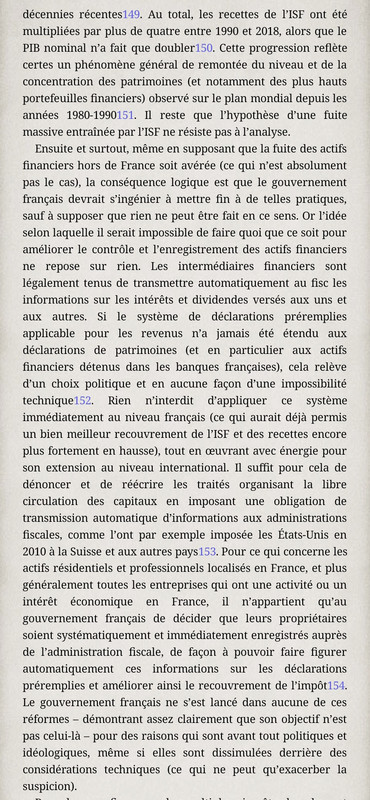I don't understand people like you.
For me, it's impossibly naive to believe that our disinformation( doesn't exist, or) will be censored as much as the disinformation of our opponents, yet that's apparently the new mainstream opinion.
And x.com is the only social media to have implemented Community Notes.
sousmerde_retardatr
Hi,
I was thinking about what you said.
In a word, you were saying that if Israel's enemies take every necessary step to ensure Israel's safety in a permanent manner, then a two-states solution(, including giving back the "illegal" settlements,) could be envisioned, that's a unilateral loss enabled by the law of the strongest. An inversed unilateral loss, in favor of the pro-palestinians, would see them taking back the holy lands. And a balanced exchange would have those who take(, western countries,) give something back(, of equal value,) in exchange.
At least expressed like that the first unilateral loss doesn't seem more moral than the second one, but it is true that this loss can be more or less important(, e.g., disparition of Palestine, or a two-state solution, or only a jewish territory in a small part of the current israeli territory). Yet the second choice could(should?) also be seen as the most moral of the three, when it takes the year 1900 as a baseline for saying that Israel's destruction is a neutral gain/loss for both sides(, instead of a unilateral gain/loss for one of them if we take the year 1960 as a baseline).
I'm in favor of making a trade by giving something worthwhile in exchange of the holy lands, but as you pointed out this is unrealistic, so let the strongest prevail i guess.
"I do agree that palestinians could get back the new settlements of the last decades and end any future palestinian persecution if they&'their allies' recognise Israel" is what i wanted to add, not sure that we would have followed the path of least resistance if the roles were reversed, but as you said giving them something of equal value in exchange is out of question
It's just an addition, please don't feel any obligation to answer, and thanks for the chat
Afghanistan, like Vietnam, was not an existential threat to the US. It's not really comparable because of this.
It's not comparable because the disparition of Israel would be an existential threat to the u.s. ?
Realpolitik just means acknowledging the political realities of their situation. Political realism.
Without discussing what should be, only how to do it(, and usually without considering the morality of the path taken, only its assumed effectiveness, there're reasons to believe that Machiavel wrote The Prince as a criticism and not a support b.t.w.).
If i remember correctly J.Mearsheimer liked realism for its predictive power.
Guerilla warfare can sometimes be effective, however I do not believe this approach will lead to victory against Israel
Only because Israel's territory isn't populated by palestinians, which is why i mentionned Ukraine, whose annexed/liberated territories aren't anti-russians like in eastern Galicia, perhaps because they believe that Russia is large enough to become a.n 'future continent'/'original culture' by itself, and want to believe in this idea, and/or perhaps for other reasons. But w/e.
For Israel this isn't a fight to colonize, it's a fight to exist. There are many Arab nations that could take in Palestinians, not so for Jews.
They can go in "the first&free world" if that's your argument.
And they're colonizing more territories because it's a fight to exist ?
As this comment pointed out : palestinians are at most a threat in the future, but aren't strong enough currently to be deemed a serious threat, a fight for survival implies an enemy strong enough to kill you, and as you previously recognised, if we're only talking about palestinians, then they're not there( yet).
Israelis were relatively safe all these decades(, compared to their neighbours), and i could only imagine that Palestine's destruction would enhance their security if arabs/muslims accept it and refuse to stand for palestinians, and if israelis stop there, because they would still have to invade/coup such countries as Iran or political movements such as Hezbollah, and would continue as long as they're not accepted.
If you presented Israel's survival as 'a moral argument'/'what should be', which would probably not be "realist" to do so, then i could return the same argument for palestinians, and ask you why you don't support the intifada on these same moral grounds, but you more likely said that to explain their motivation and give an estimation of their strength/resolve.
I believe you are overestimating both international support for Palestine and the military capabilities of most African and South American nations
As you saw afterwards, i wasn't talking of a military fight, but of a.n economic&diplomatic one(, even if coups generally imply a military role, sometimes bloodless but very often not).
most of their Arabic neighbors recognize that making an ally of the United States and the EU is far more strategically valuable than backing this group that wants endless war and seeking unreasonable demands.
Unreasonable because they won't ever win ? Well, who knows ?
I don't see them supporting Israel and abandoning palestinians(, only Morocco's gains would be significant, yet they're still seemingly hesitant), i'll agree that they still have a margin of retaliation/pressure towards the west though, perhaps are they forced to wait for a more opportune time to act or, as you said, have accepted such unconditional loss, not sure that we would have if the roles were reversed. As previously mentioned, they wouldn't win anything by complying, and i don't see clearly the extent of what they'd lose by resisting(, some could include their honor or other immaterial examples).
Hamas launched this attack because Saudi Arabia was about to recognize Israel, after all, and SA is dependent upon the US for security. If they alienate the US they have Iran to contend with.
In my opinion Saudi Arabia has more reasons to be afraid of the u.s.a.&co than of Iran, since, except for the Gulf monarchies, every single one of their neighbours 'has been'/'is being' destroyed : the color revolutions, Mohamed Morsi, Lybia, Sudan, Eritrea, Yemen, Iran, Iraq, Syria, and even Lebanon is in an economic crisis(, and kinda Türkiye as well), you just have to open a map and list every country. If we're going a bit further then we have Afghanistan, Pakistan, Nagorno-Karabakh, almost all countries destroyed by the west, and i haven't counted kurd separatists or the islamic state, it's not a stretch to think that they desire stability, but what a f*cking world, we don't understand that, Ethiopia, Somalia, Kenya, Congo, Chad, Niger, central asian republics, Georgia, ..., these countries seems far away, if the realist choice is just to always follow the strongest regardless of what's right/fair, then i don't want to be a realist.
Russia has its own issues right now and cannot afford another front
Is there a single non-western country more active than them around the world currently ?
Given their behaviors in Chechnya, they do not seem to be sympathetic to Muslims.
As if they didn't lose enough historical territory in 1991, V.Putin's party isn't called United Russia for nothing, of course we(sterners) supported the separatists terrorists(, but hated them when these "orks" fought on the side of Russia&'south-eastern ukrainians' recently).
The first hostage released by Hamas was an israeli who also had a russian nationality, and there were other gestures if this kind of things matter, the timing of the l.g.b.t. ban may perhaps also be linked in some way, i.d.k.(, they also have their own muslim republics in the russian federation, Chechnya is apparently very homophobic, and it's not only inside their borders or in the Middle-East, but in Africa as well), just to say that i wouldn't count on their islamophobia.
If such creatures exist, they haven't weighed in
The (uncaused )Cause is the only being which isn't a creature(, and the only to be the Being), i don't think a direct visible interference would be that desirable, everything would just be solved and there wouldn't be anything else to do, i prefer to feel free, but in any case there's always determinism and God as the Cause for this kind of interrogation.
It would be like humans trying to control ant societies in our backyards, why would we care?
Not sure that despite our imperfection we wouldn't be a part of the All/One, and there's always the law of karma among other laws of our reality, parts of the All do care, and if we look/seek the Greatest we/ants do care.
I hope we get there one day, albeit through secular means.
You didn't wrote that to imply that we should only get there through secular means(, by fighting other paths), but i find interesting that we fight communism and islamism : apart from these two, and royalism, do you know of a single large ideology that survived the colonization and isn't the western one of a constitutional capitalist secular republic ?
I wrote about these communities with their own rules because i feel that we're unfortunately looking for unity at the expense of diversity, instead of looking for a permanent peace in harmony, ensuring both our unity and our diversity, we're not looking towards this direction, and there's even this selfish nationalism saying that it's not our role to help each other, i can't like it, we should aim to live together.
Certainly I can understand their outrage, but how to logically respond would depend upon a nation's ability to change that situation.
We're arriving at the end of the discussion then, because we can argue about their chances but in the end none of us (can pretend to )know.s the future. Here's why i think that the law of the strongest doesn't necessarily work against them :
Afghanistan is the best modern example of people who won against impossible odds.
Since you mentioned "realpolitik", and while you may have heard of it before, you could have heard it again recently with John Mearsheimer and others during the war in Ukraine, it is linked to Afghanistan in that, if all ukrainians were (traitors )like those in eastern Galicia, i doubt that Russia could have kept these territories : they would have had to face constant "terrorism" by more numerous inhabitants.
In the same spirit, wars for decolonization could also count as other examples of successful fights against overwhelming odds.
Yet when i'm thinking of such examples it's about locals united in their perception of foreign armies as the enemy, and couldn't be applied for Israel(, not occupied by a majority of locals/palestinians).
Even without that, they can win(, i.d.k. if they will,) if the ummah was united.
If it wasn't enough of a weight(, i doubt it), they would certainly change the scale by uniting with Africa, the rest of Asia, Russia, and also South America. That'd mean even more coups by the west in order to keep control, and then by the rest, we(sterners) are lucky that they're still closer to us.
(What interest me more is whether they should win(, and on what terms), the law of the strongest shouldn't matter, but even through that lens, )Here's a (naive )picture of how it could happen :
- they'll throw a lot of propaganda to make their citizens f*cking hate to death israelis, painting them as monsters by recycling their war crimes and implying that they're doing so because they're evils, not because they want to survive, antisemitism could also help in that ;
- they'll progressively cut all economic ties with the west as long as we dont accept their request, and have prepared beforehand as much as they can to withstand sanctions/'economic war' ;
- they'll strengthen their link and, this is important, pledge publicly and repeatedly that they'll invade each other if(when) someone is elected(, or placed after a coup,) that intend to break this oath ;
- they'll regularly make military threats to Israel, but without acting upon it unless they know how to get rid of the bomb, so mostly to mark a point before diplomatic meetings and eventually take a habit of strengthening popular support like that, rejoicing in the fear that they think it may bring israelis, and of the coming day when they'll conquer back their lands, as well as enact laws against israelis or even perhaps westerners ;
- ...
If 'fairness is excluded'/'might makes right'/'the only factor is strength', then they're not weak.
Only God would know how to solve this situation in the most perfect manner(, ideally if we were perfect/'never doing anything that another being would consider bad for h.er.im' then we wouldn't rely on states, laws, borders, ..., for protection, just freely join and leave communities with their own rules and paradise would come unto Earth, lands wouldn't belong to anyone and we wouldn't possess anything else, only living to do good to each other, but since we're not perfect it's useless to point that out(, Israel would be destroyed if they acted like that, and Palestine wouldn't be recovered, and more generally societies would collapse, Christ is/shows the Way but if the other don't also believe that he's one with you it obviously quickly becomes useless, sry for the unproductive rambling).
Your answer for the past is that Israel should have been allowed to take "back" these (holy )lands, important for all the "children" of Abraham, perhaps that the arabs are also attached to these lands and would prefer to see them ruled by arabs/muslims, and not israelis/jews, they also had/have an importance for christians(, crusades). If they ever agree to lose one of their "hearts", then fairness would require to give one of our "hearts" in exchange to palestinians(, with a lot of money, e.g. 0.1% of the g.d.p. of every country for a year, as well as the promise to leave the Middle-East alone, to lift sanctions, to ensure the security&'total separation' of both Israel and this state, etc.)
I think that it is the root of our disagreement, you're starting from their right to take these lands to explain that the sins done by Israel were necessary(, if so are they still sins ?,) since they had hostile neighbours who wanted their destruction. Destroying Israel would be awful, but destroying Palestine is justified because they didn't accepted Israel in the first place. Perhaps, i think that their desire to expand their borders is more important than their desire for security, but to get back to the "root" of our disagreement, you've seen that i'm not among those who want israelis to g.t.f.o., but i can't blame those who do(, would you have accepted if they took one of our "hearts" by force ? It's not Mecca or Medina but still).
You may think that it's not such a big deal to take/keep these lands, perhaps you're right, everything is relative, then perhaps that in the same sense it wouldn't be such a big deal to give them a territory as well(, it could be the occasion to seal an alliance).
If you'd like a one sentence summary : You probably wouldn't have accepted it either if islamists took a portion in the heart of our lands, not by might at least, but possibly if you/we were given something which would 'be satisfying'/'made it acceptable'.
Now that i think about it, i can't resolve myself to say that they don't have any legitimate right to revive their culture on their ancient lands(, still don't agree with their refusal to be christian or muslim as well though, John and Muhammad ﷺ were prophets, the disagreements aren't worth such profound schism, we follow Abraham, and more importantly (virtues and )God, christianity and judaism could be considered as sects of islam, or all of them sects of abrahamism(, that's diversity without unity here)), but i know that we(sterners) wouldn't owe arabs anything in exchange if it was totally just/fair to take these lands, so i'll stay with my conclusion : the problem isn't that Israel's existence isn't accepted by palestinians&muslims, but that we didn't made its existence acceptable, in other words it's up to us to make this right.
You'll probably say that we won't make their loss acceptable, then i don't see why they should accept it, or why they should care if Israel disappears, if it's the law of the strongest then they have a chance to win( for all i know).
Fair enough, i'll just point out that with such enhanced surveillance it'd be even more difficult than currently(, and ideally impossible,) for people loyal(, or hostile,) to Trump to cheat the election. Thanks for the chat
Jews started out legally buying lands in Mandatory Palestine until they were massacred and had war waged on them on when they declared statehood. Any lands annexed was a result of this.
The Ottoman Empire forbade them to buy these lands during the XIXth century, and would never have accepted the british decisions, were the arabs just supposed to let them declare statehood ?
Polling indicates Palestinians want intifada and a one-state solution where Jews are denied equal rights, and they outnumber Israelis.
And what do israelis want ? A two-states solution ? Why won't they put an end to the settlements then, and why is it anything else than a net gain for them and a loss for palestinians ?
What are the compromises that we(sterners) are making ?
Anger will not change their situation, it has led to it being this way.
The anger of israelis led to them killing thousands of people, no ?
But yeah, you're probably right, i don't really know what they expected, some kind of victory perhaps, they're at war as well, and seized an occasion.
If ummah were a factor here I suspect Egypt wouldn't be keeping Rafah closed, they clearly care more about using them as pawns with claims to land than they do the lives of Gazans stuck there.
If Egypt cared about palestinians they would help Israel in deporting them ?
While there is only one Jewish state there are many Arab/Islamic ones in the area and none of them seem willing to help Palestine, probably because those who did suffered for it with coups and terrorist organizations within their borders.
Most of them are still suffering because of their support/principles. Every single one of them is willing to help Palestine, but the more you're trying to put pressure and the more you're exposing your citizens for reprisals, so the extent of their actions may vary, i still think that they could win but what do i know really.
(And realpolitik don't look at morals, it is machiavelism, looking for what's fair/right/virtuous and then the realist ways to do this seems a better practice)
I have much to learn by talking with a pro-israeli, my sincere thanks for engaging.
[The claim that "if you kill their leaders they'll just elect new ones"] has yet to be established
As i said with Benjamin Netanyahu : killing him won't destroy Israel, just as killing their leaders wouldn't destroy Hamas.
We have to solve the root of the problem, because "Hamas"(palestinians) have the moral high ground here, « If israelis are unwilling to pacify themselves, the destruction of Israel seems like the most humane remaining option that keeps Palestine safe. », wouldn't you agree ?
« Palestine was annexed because israelis declared war on Palestine and won, funny how the Anti-Palestine crowd always conveniently forgets this and portrays the israelis as victims when they were absolutely the aggressors. »
« If israelis are reasonable, yes [killing them would be enough to deter them from killing more palestinians and occupying (more&more of )their land]. It would encourage them to find a path to peace. Perhaps they are not reasonable, their history of poking the bear, popular support of settlers and a one-state solution where they deny rights to palestinians certainly seems to indicate an unwillingness to compromise, which led to their present situation. »
I can't understand how you could paint the israelis as the victims here : they were the ones who stole the lands(, and are continuing to steal more of it), they're killed way less than they're killing, both before and after Oct.7, with less material destructions, yet i can't wish for them to permanently excuse themselves for existing, even if they should. There's a few solutions possible other than a two-state solution, i can only regret that public debates don't turn around this research of solutions instead of simply supporting one side, the anger of palestinians is legitimate, but what's the plan. Israel is asking for a lot and can't offer much in exchange, if i was arab i could consider that such weird locations could have a weird civilization different from the rest there, after all the muslims have expanded so much that they could accept to 'paint in another color'/~lose one of their heart, but not without consequences for israelis/westerners, it should result at the very least in a huge boost for the ummah, something deemed worthwhile by all of them, which won't happen since we(sterners) won't give any of our "hearts".
A crazy idea would be to plan for all countries to ally together in order to colonize and terraform Mars(, with commitments to certain realizations), from 2070 to 2177 for instance(, or longer if necessary), and our collective effort will be entirely done in order to give the whole planet Mars to countries claiming to be islamic. It's a good situation in the solar system, and despite many problems and uncertainties could be deemed a huge gain without being more than a financial loss for other countries. Other possibilities exist even if this one may seem/be far-fetched.
(i didn't know that, it'd require more researchs than i did on the claims of each side, they'd perhaps say that the coverage was insufficient).
In my opinion we don't have anything to lose by strengthening our electoral system, and every accusation is an occasion to improve it, unless you think that it is already failproof, i've seen long lists of arguments at the end of 2020, but John Oliver also made three videos on the topic of fraud prior to that, and our side didn't hesitate to have doubts twice on the results for Bernie Sanders, whether it happened or not, i do think that cheating is a serious possibility and that such claims should be solved by better measures to please the future candidates/incumbents, instead of only relying on censorship(, youtube, facebook, twitter, ...). To sum up, he did commit to a peaceful transition, and we don't have much to lose by implementing an even stronger surveillance of the procedure for the next elections.
You're evidently right, but many articles for the 2021 elections(, 1, 2, 3, ..., including the one cited), said that it has been 15 years since the EU sent observers.
In any case i would like to emphasised that this debate isn't useful : even if westerners systematically sent observers they would still claim that the results are illegitimate because of the overall process(, which deserve some explanations/debates because our own system is far from perfect, and we're blending the consequences&causes of the sanctions, etc.). I should have deleted this post like i intended at first once i realized that.
A few more minutes of research wielded these results :
- EU won't send observervation mission in Bangladesh : https://www.thedailystar.net/news/bangladesh/news/eu-wont-send-observeration-mission-3424326
- The United States, European Union, France and Japan say they have no plans to send electoral observers or to provide assistance to Cambodia : https://www.rfa.org/english/news/cambodia/election-international-observers-03312023140751.html
- The Organization for Security and Cooperation in Europe (OSCE) will not send observers to Russia’s upcoming elections for the first time in nearly three decades : https://www.rferl.org/a/russia-elections-osce-observers/31393760.html(, "The insistence of the Russian authorities on limiting the number of observers we could send without any clear pandemic-related restrictions has unfortunately made today’s step unavoidable. The OSCE had been invited to observe the Russian elections, but the number of allowed observers was later restricted to 60 due to what Russian authorities cited as the deteriorating pandemic situation in the country. (...) The OSCE had assessed earlier this year that it needed 80 long-term and 420 short-term observers.")
- The European Union has scrapped plans to send observers to a parliamentary election in Ethiopia next month : https://www.reuters.com/world/africa/eu-scraps-plan-observe-ethiopia-election-2021-05-04(, criticism of their official reasons here https://euobserver.com/opinion/152293 : « The International Republican Institute and National Democratic Institute sent missions to observe, and the African Union sent 120 observers. Yet the EU decided against sending a delegation, despite promises earlier in the year to do so. (...) The African Union's observer team has praised the election, as have ambassadors from Sweden and Denmark. », that's exactly an example of what i'm talking about, with false excuses/pretexts.
I didn't write that we refused to send international observers to Russia, but that « i've read such suspicions about Russia and Iran, we even showed videos of a ballon in front of the c.c.t.v. for Russia », despite « the reasoning that when you're so overwhelmingly popular there's no need to miscount the votes in your favor ».
It appears that we did send international observers(, until 2021), but my point is that it wasn't necessary, yet we're still showing suspicions(, e.g. the balloon in front of a c.c.t.v. to take an example).
I'd just like to end by saying once again that this whole debate is pointless because it doesn't change anything in the end, whether we systematically refused to send observers, or always sent them while accusing the whole "democratic" process instead(, it's apparently in-between, but much more the latter than the former, contrary to what i initially thought).
I should have deleted this post from the start like i first intended once i realised, in the selftext, that « In the end sanctions would stay in place so it wouldn't be useful in any way, and doesn't matter, i should probably delete this post but i'm leaving it in the off-chance that some find an interest in it. »
Sorry if you felt that i wasted your time.








Il doit être 'encore plus difficile'/'quasi-impossible' pour des associations nouvellement créées d'obtenir cet agrément, pratique pour lutter contre l'anti-corruption.
Et les gens ici n'ont pas réalisé que ces menaces/problèmes durent depuis plusieurs années, même si c'est de pire en pire, le gouvernement pourra faire disparaître Anticor sans aucune conséquence et nous oublierons rapidement.